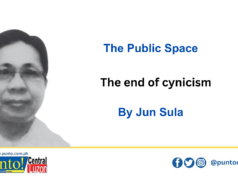TODAY WE take our inspiration from a word that is repeated in practically every verse of our responsorial psalm: ROCK. It should remind us of what Jesus said to his disciples at the conclusion of his Sermon on the Mount in Matthew 7, where he speaks about the wisdom of BUILDING A HOUSE ON ROCK.
He must have learned this from Joseph, his carpenter father, who was a builder. You don’t build a house on sand, he says. Rather, you build it on rock, meaning, on solid foundation, if you want it to be able to withstand the test of time and natural calamities.
Sometimes, when calamities like earthquakes happen, our buildings are tested. We have reason to be alarmed when we begin to see cracks and disjointed beams. It is then that we usually seek the services of a structural engineer to evaluate their structural integrity. When the engineers find out that the integrity of the structure has been severely compromised, they declare it condemned and order its closure. They warn the owner that one big shake can make it collapse and cost people’s lives, and the owner could be held accountable for the disaster. The choice is either to spend a lot of money retrofitting it to save the structure (like we do with heritage churches), or to demolish it all together and build a totally new one.
We are presently in a global state of calamity. Our societies are like houses that have been severely tested by a microscopic virus. Economies are at the brink of collapsing, health care systems are getting overwhelmed, political systems are getting tested, businesses and industries are folding up, people are going jobless. Governments are challenged to cushion the tremendous impact of these developments on the people.
And so, it is worth asking: Will we just aspire to get back to normal after this global crisis is over, knowing that the house in which we live has been severely damaged? Will it be good enough to do some retrofitting, or will we need to demolish and rebuild?
In today’s Gospel, Jesus is being quizzed by the Pharisees. He should feel insulted because the question that they ask him is a typical question that a rabbi would ask a 13–year–old Jewish boy when he undergoes the Jewish ritual of coming of age, called Bar Mitzvah.
The question is, “Which commandment of the law is the greatest?” But Jesus rides along. He answers the question anyway, perhaps even in the sing-song way in which the kids recited it from rote memory, the line from Deuteronomy 6 called THE GREAT SHEMA: “Hear O Israel, the Lord is your God, the Lord alone. Therefore, you shall love the Lord your God, with all your heart, with all your soul and with all your mind.”
But after reciting it, Jesus suddenly pulls the rug under their feet by adding a second. What second? There was not supposed to be any second as far as the Pharisees were concerned. At least not as they learned it in school. And he in fact says, “The second is LIKE IT.” Meaning, it is of the same value as the first, something you cannot do without: YOU SHALL LOVE YOUR NEIGHBOR AS YOURSELF.
He gets this from Leviticus 19, which, by the way, is practically the equivalent of our first reading from Exodus 22. Leviticus 19 begins with: “BE HOLY FOR I THE LORD YOUR GOD AM HOLY.”
Remember, the background is, we are supposed to be the image and likeness of God. If God is holy, then he expects us to reflect his holiness in the way we live our lives. And the rest of Leviticus 19 is a practical elaboration on what that call to holiness entails. It is not just about engaging in pious practices like praying and offering sacrifices in the temple; it is rather about being merciful and compassionate to the most disadvantaged in society.
The late Latin American bishop and theologian Pedro Casaldaliga calls it POLITICAL HOLINESS. It is supposed to be the solid foundation on which Israel was required to build a humane society: namely, prioritizing the welfare of the most vulnerable ones in society, like the strangers or migrants, the widows and the orphans, and, if we may add, the poor, the persons with disabilities, the elderly, the physically and mentally ill, the jobless, the homeless, etc.
Jesus sums it up with LOVE OF NEIGHBOR AS ONESELF, and practically says that what we claim as LOVE OF GOD is false without it. Saint John says this too in his first epistle, 4:20. He really rubs it in. I am a liar, he says, if I claim to love God whom I don’t see but do not love my neighbor whom I see, and who is supposed to be the visible image and likeness of God!
A few days ago, we had an interfaith dialogue sponsored by the Sisters of Our Lady of Sion. The person who spoke before me was a Jewish professor and peace advocate. I represented the Catholic Church. After me was a Muslim lady lawyer and professor at UP. The last one was a Protestant lady liberation theologian.
Among the things that I found most striking, the words of the Jewish scholar really struck a chord. She said we can only start to dialogue if we humanize, not demonize the ones we dialogue with. The Muslim lady lawyer on the other hand referred to love of God and of neighbor as oneself as the foundation of dialogue.
I checked out the interfaith dialogues that had been previously done in the presence of the Pope and the other religious leaders at Assisi and found out that all the others, including the Buddhists and the Hindus, aside from the Jews and the Muslims affirmed the basic statement that love of God and neighbor as oneself was the unquestionable foundation of dialogue.
I have said this on many occasions before: perhaps our societies are still built on the flimsy foundation of competition, the survival of the fittest. We have tended to use our intelligence against each other, following, not our human but our basic animal instincts.
Is it possible that we are just beginning to experience a fuller evolution towards a better version of the human species? Jesus has a different term for the better version of ourselves: not just a THINKING HUMANITY (Homo Sapiens) but a LOVING HUMANITY (Homo Amans).
Perhaps it is good news after all that the Covid–19 has shaken the weak foundations of the civilization of egotism that we have built in the past centuries of human history. Now we can invest all the blood, sweat and tears that we can in order to usher in a new and higher form of humanity that will rebuild a new civilization on the solid foundations of love of God and of neighbor as oneself.
(Homily for 25 Oct. 2020, 30th Sunday in Ordinary Time, Mt. 22:34-40)





